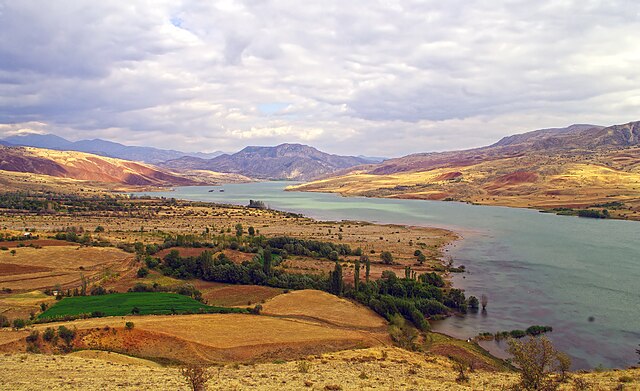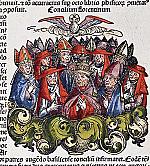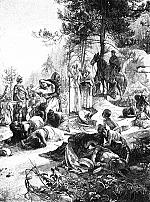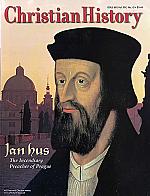The emperor, the healer, and the teacher

[A view of Kılıçkaya Dam Lake, Suşehri, Sivas, Turkey—Zeynel Cebeci / [CC BY-SA 4.0] Wikimedia File: Kılıçkaya Dam Lake - Kılıçkaya Barajı 03.jpg]
These three men grew up hearing the truth and initially rejecting it; their conversions changed civilization.
Constantine: imposter or true believer?
Constantine (c. 272–337) has earned a place in history for many reasons—not least because, by his Edict of Milan, he ended Christian persecution by the pagan Roman Empire. The document bid farewell to the martyrs’ age and presaged the Christian empire. But what sort of man was Constantine “the Great,” the first emperor of Rome to place himself on the side of the Christian church? And how devout was he?
Constantine was born on February 27 in Naissus. His father, Constantius, was an army officer who became a subordinate emperor within the tetrarchy established by Diocletian (c. 284–305); his mother was Helena, a woman of lowly origins. Little is known about their religious attitudes, but evidence suggests that Constantine may have had Christian family members.
As a potential successor, Constantine spent a dozen years at court, where he witnessed the Great Persecution (303–313). Constantine left for Britain after Galerius succeeded Diocletian as a senior emperor (augustus) on May 1, 305, and joined his father—now also an augustus. Upon Constantius’s death in 306, his troops saluted Constantine as augustus in his place. But Constantine would have to validate his title on the battlefield. On October 28, 312, he defeated Maxentius at the Milvian Bridge, a dozen miles up the Tiber from Rome, gaining sole rule of the Western Empire. Twelve years later, he became “Ruler of the Entire Globe.”
From the winter of 312–313 onward, Constantine’s actions, edicts, and letters reveal increasing favor toward the Christian church. He believed that the Roman Empire’s well-being depended on God; God would prosper the empire’s fortunes as long as its inhabitants truly worshiped him. This true worship (so Constantine held) came from the Christian church; the true God was the Christians’ God.
Constantine’s conviction of this began on the eve of the Battle of the Milvian Bridge. A dream convinced him to enter the fray, trust in the Christians’ God, and display a Christian emblem. For Constantine a shift in religious allegiance—a conversion—took place, and it was confirmed by his decisive victory.
He probably never gained a good grounding in Christian doctrine, however. As late as 324 he regarded the momentous divide between the heretic Arius and his opponents as “a small and very insignificant question.” He never spoke of “Christ” and “our Savior”: rather of “the divine power” or “the supreme Deity.” Constantine was baptized only after the onset of his final illness, not long before dying on Pentecost, May 22, 337.
Sources offer little access to the private Constantine. Though he was no consistent Christian, never sharply broke with his former paganism, and was even occasionally cruel, one can glimpse Christian inspiration in his legal enactments.
Constantine launched the church to becoming the Roman Empire’s official, established religion and laid the foundations for the Byzantine Empire. By his patronage he aligned former martyrs—persecuted, powerless, and pacifist—with the military might and earthly glory of the state. Christianity would never be the same again; in some ways for the better, in others, for the worse.—David F. Wright, from CH #27
Basil: house of healing
Basil (330–379) was born into a Christian family from Cappadocia in Asia Minor (central Turkey). His grandfather had suffered a martyr’s death during Diocletian’s persecution. Nonetheless, by Basil’s time, his family commanded both wealth and prestige. Basil received the best education possible in classical rhetoric. He planned to rise in society by teaching oratory like his father and then pursue a political career. But it was not to be. He wrote:
I had wasted much time on follies and spent nearly all of my youth in vain labors, and devotion to the teachings of a wisdom that God had made foolish. Suddenly, I awoke as out of a deep sleep. I beheld the wonderful light of the Gospel truth.
Thus Basil returned to the church. He then pursued asceticism, devoting himself to prayer and fasting, finally founding his own monastic community in the Pontic mountains, north of Caesarea. In 365 Basil was ordained a priest for Caesarea, and five years later he was elected bishop. There he strove to create a new type of Christian monastery—one focused not only on salvation, but also on the physical care of the sick and poor. The idea came from an influential monk from Asia Minor, Eustathios, who convinced Basil that a true Christian monk should not just pray and contemplate God, but also serve others. Eustathios founded urban monastic communities that also helped the poor, sick, homeless, and even lepers.
Basil worked out these principles in his own monastery. Such pioneering ways roused resistance. Basil had to defend his actions to Cappadocia’s governor: “Whom do we harm when we establish hospices for strangers, both those who are visiting on a journey and those who are in need of some care because of illness? For these people we have set up the necessary help.”
Perhaps the most radical aspect of Basil’s community was its service to lepers. Greek physicians had no idea how to cure them, but Basil felt they still deserved care. Basil also tried to convince his fellow Christians that medical science did not oppose God’s will but was God’s gift. Greek medicine concerned Christians due to its association with the cult of Asclepios. They were also suspicious because it put faith in human logos rather than in the Divine Logos, Christ. Basil countered these arguments, recognizing medicine as God’s gift while also stressing that all healing ultimately comes from him.
As bishop, Basil helped to create the Christian hospital by uniting the urban monastic movement to an institution that included hospital care, physicians, and nursing staffs, as well as changing Christians’ minds about God’s role in medical science. In 379, when Basil died, Bishop Gregory of Nazianzus praised him for what he then named in his friend’s honor, the Basileias:
Go a little way outside the city to see a new city, the treasury of piety, a common treasure room of those who have possessions where superfluous wealth . . . is stored. . . . In this institution diseases are studied, misfortune made blessed, and sympathy put to the test. —Timothy S. Miller, from CH #101
Augustine: a wayward son
Augustine (354–430) could not escape his devout mother’s fervent prayers. Self-indulgent sins marked his adolescence, but Monica never stopped praying. When he took a mistress, fathered a son, and joined the gnostic Manicheans, she prayed all the more that he follow Christ.
The wayward son had different plans. At 21 years old, the precocious scholar became a rhetoric teacher. Eight years later, he left North Africa for Rome, tricking his mother into staying behind. But Rome disappointed Augustine. Instead of amassing wealth, the trickster found himself tricked. Students bilked him of his fees and had no serious interest in their studies.
Yet Rome led him to reconnect with a childhood friend, Alypius, a judge in the city. And he made the acquaintance of Symmachus, a magistrate connected to the Manicheans. Symmachus recommended Augustine for a prestigious teaching position at Milan. He accepted the offer and moved north, Alypius joining him.
Now affluent, Augustine invited Monica to come live with him. But he struggled spiritually. The Manicheans could not answer his most difficult questions. He sought out Bishop Ambrose, one of Milan’s most notable figures and a powerful speaker. Ambrose intrigued Augustine but couldn’t convince him of Christianity. Still he visited Ambrose’s church frequently to enjoy the bishop’s rhetorical skill. Both the antiphonal singing and preaching of the gospel spoke to Augustine. He started reading the Bible and found the writings of Paul stirred his soul more than either Manicheism or philosophy.
Augustine finally confronted his sexual sins. He rushed into the garden and wept, asking the Lord, “How much longer must I live in turmoil of spirit?” Then he heard a childlike voice chanting, “Take up and read.” When he opened the New Testament at random, his eyes fell on Paul’s words in Romans 13:13,14: “make no provision for the flesh, to fulfill its lusts.” Augustine converted on the spot and Alypius followed his example.
After months studying Scripture, Augustine and Alypius were baptized on Easter day, celebrated in Milan on April 25 in 387. Following Monica’s death that same year, Augustine sailed back to Africa, taking his son with him. Impressed with the monastic ideal of St. Antony, Augustine and Alypius founded a monastery. They both became priests and then bishops in North Africa: Augustine at Hippo and Alypius at Thagaste.
Proving to be a brilliant theologian, Augustine imprinted the medieval church with his views. He wrote prolifically. Among his famous writings was Confessions, considered to be the world’s first psychological autobiography. When in 410 Alaric and the Visigoths sacked the city of Rome, and pagans blamed Christian pacifists for the disaster, Augustine responded with another prose masterpiece: The City of God and the City of Man.
When Augustine was dying, he had the shorter penitential psalms posted on his wall in large letters so he could read them over and over. He prayed and wept, embodying Monica’s lifetime of prayers in the close of his own.—Dan Graves, from our website CH
By David F. Wright, Timothy S. Miller, Dan Graves
[Christian History originally published this article in Christian History Issue #150 in 2024]
David F. Wright (1937–2008) was emeritus professor of patristic and Reformation Christianity at the University of Edinburgh. Timothy S. Miller is emeritus professor of history at Salisbury University (Maryland). Dan Graves does layout for CH and writes for Christian History Institute (CHI).Next articles
Conquests and convents, division and dung
Expanding Christendom, if necessary by force, had become part of a king’s duty.
G. R. Evans, Ann K. Warren, George T. Dennis, Daniel V. RunyonMoments that mattered
Issues that stood out to previous editors and contributors.
Elesha Coffman, Bill Curtis, David Neff, Jennifer Woodruff Tait,







